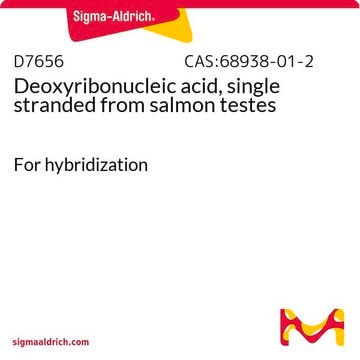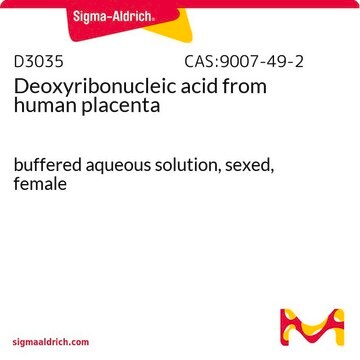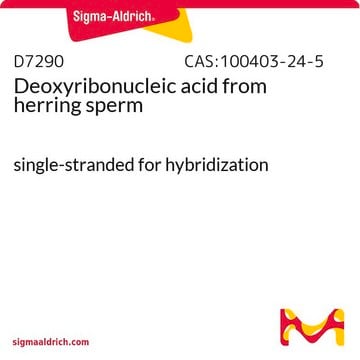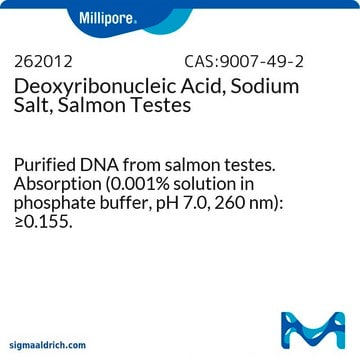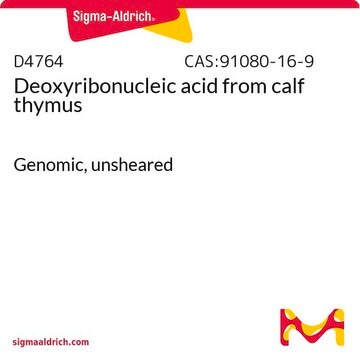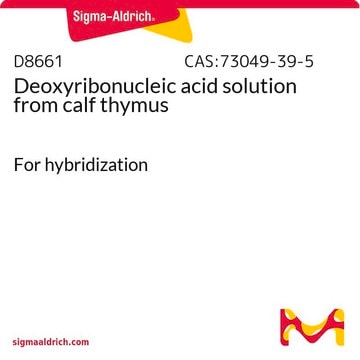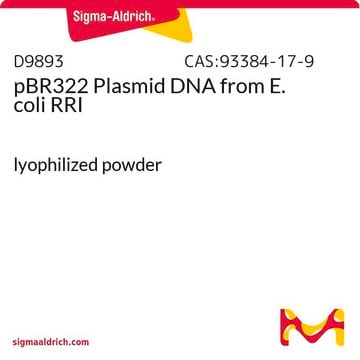D4889
Deoxyribonucleic acid sodium salt from Escherichia coli strain B
Genomic, unsheared
Sinónimos:
DNA
Iniciar sesiónpara Ver la Fijación de precios por contrato y de la organización
About This Item
Número de CAS:
Número CE:
Número MDL:
Código UNSPSC:
41106310
eCl@ss:
32160414
NACRES:
NA.52
Productos recomendados
grado
Molecular Biology
for molecular biology
Nivel de calidad
Formulario
lyophilized powder
mol peso
>45 kb
temp. de almacenamiento
2-8°C
¿Está buscando productos similares? Visita Guía de comparación de productos
Categorías relacionadas
Descripción general
Escherichia coli strain B is most widely studied DNA after k-12. The genomes of E coli strain B and k-12 show differences in the IS sequence elements. Strain B have B-islands and express O-specific side-chain LPS. The product is unsheared genomic DNA.
Especificidad
50% GC; Tm = 90.5 °C
Aplicación
The DNAs are particularly useful for genomic analysis, including PCR, library construction in bacteriophage λ, and in heterologous pre-hybridization and hybridization protocols.
Deoxyribonucleic acid sodium salt from Escherichia coli strain B has been used for:
Deoxyribonucleic acid sodium salt from Escherichia coli strain B has been used for:
- PCR reactions of genomic DNA of Gardnerella vaginalis
- nick translation and radiolabeling of dNTP
- generating standard curve for 16S rDNA quantification
- transfecting neutrophils
- testing the extraction methods
Definición de unidad
One unit will yield an A260 of 1.0 in 1.0 ml of 1 mM Tris-HCl, pH 7.5, with 1 mM NaCl and 1 mM EDTA (1 cm light path).
Nota de preparación
Purified by anion exchange chromatography, dialyzed against a solution of 1 mM sodium chloride, 1 mM EDTA and 1 mM Trizma HCl, pH 7.5 and lyophilized at a concentration of approx. 2 units per mL. Approx. 20 A260 units per mg DNA. % GC is the percentage of G/C base pairs. Tm is the temperature at the midpoint of the thermal denaturation profile.
Nota de análisis
Analyzed by gel electrophoresis and visualization after ethidium bromide staining, with single predominant band of 45 kB or greater.
Otras notas
DNA in solution will reanneal on standing at room temperature so it is recommended to boil the solution for 10 minutes and then cool on ice for at least 5 minutes prior to use.
Producto relacionado
Referencia del producto
Descripción
Precios
Código de clase de almacenamiento
11 - Combustible Solids
Clase de riesgo para el agua (WGK)
WGK 3
Punto de inflamabilidad (°F)
Not applicable
Punto de inflamabilidad (°C)
Not applicable
Equipo de protección personal
Eyeshields, Gloves, type N95 (US)
Elija entre una de las versiones más recientes:
Certificados de análisis (COA)
Lot/Batch Number
¿No ve la versión correcta?
Si necesita una versión concreta, puede buscar un certificado específico por el número de lote.
¿Ya tiene este producto?
Encuentre la documentación para los productos que ha comprado recientemente en la Biblioteca de documentos.
Los clientes también vieron
Genomic comparisons among Escherichia coli strains B, K-12, and O157: H7 using IS elements as molecular markers
Schneider D, et al.
BMC Microbiology, 2(1), 18-18 (2002)
Rudolph Spangler et al.
PloS one, 4(9), e7010-e7010 (2009-09-16)
PCR in principle can detect a single target molecule in a reaction mixture. Contaminating bacterial DNA in reagents creates a practical limit on the use of PCR to detect dilute bacterial DNA in environmental or public health samples. The most
Johan Sukweenadhi et al.
Antonie van Leeuwenhoek, 106(5), 935-945 (2014-08-30)
Strain DCY84(T), a Gram-stain positive, rod-shaped, aerobic, spore-forming bacterium, motile by means of peritrichous flagella, was isolated from humus soil from Yongin forest in Gyeonggi province, South Korea. Strain DCY84(T) shared the highest sequence similarity with Paenibacillus barengoltzii KACC 15270(T)
Mohamed El-Agamy Farh et al.
Journal of microbiology (Seoul, Korea), 55(10), 767-774 (2017-09-29)
Gram-staining-negative, uniflagellated, rod-shaped, designated as DCY110
Vitalii Patsula et al.
Nanotoxicology, 13(4), 510-526 (2019-02-02)
Innovative nanotechnology aims to develop particles that are small, monodisperse, smart, and do not cause unintentional side effects. Uniform magnetic Fe3O4 nanoparticles (12 nm in size) were prepared by thermal decomposition of iron(III) oleate. To make them colloidally stable and dispersible
Nuestro equipo de científicos tiene experiencia en todas las áreas de investigación: Ciencias de la vida, Ciencia de los materiales, Síntesis química, Cromatografía, Analítica y muchas otras.
Póngase en contacto con el Servicio técnico
